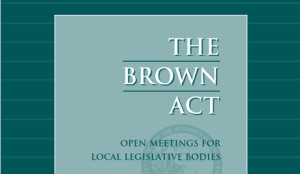The Brown Act and Facebook
The Brown Act, often referred to as California’s open meeting law, was enacted in 1953. At the time, about one in five households had yet to install a telephone. It’s a wild understatement to say that things have changed since then.
The intention of the Brown Act was and is good: to ensure transparency in government by mandating that members of legislative bodies not meet in secret. For more details on the Brown Act, check out this article from Western City Magazine.
However, in a world of blogs, tweets, and instantaneous Facebook posts, what constitutes a violation of the Act has become a head scratcher. Consider a five-person council. If one council member editorializes on Facebook, another comments, and a third “likes” the post, then a majority of the council has joined a “conversation” on the topic. As no prior notice of the conversation was given, this may constitute a violation. But how secretive can a “meeting” be if it takes place on a public Facebook? (Never mind other consideration like is a citizen comment part of the “record” and must it be included and archived?)
Indeed, that is partly the irony of the Brown Act in this case. The Act serve to squelch public engagement and discourse between local elected leaders and the public.
If there is one thing the Internet does well, it’s transparency. Local governments are streaming their council meetings online, agendas and minutes are readily available for download. Public records are more public than they’ve ever been. A “meeting” held on a social media venue is arguably more accessible to the public than a meeting held in a specific location.
And so, many people are arguing that it is time to update the Brown Act.
In the meantime, council members are encouraged to use extreme caution. Seek guidance from counsel on your online policy engagement.
What are your thoughts on the Brown Act in the modern age? Have you refrained from participating in online conversations for fear of violating the Act?


